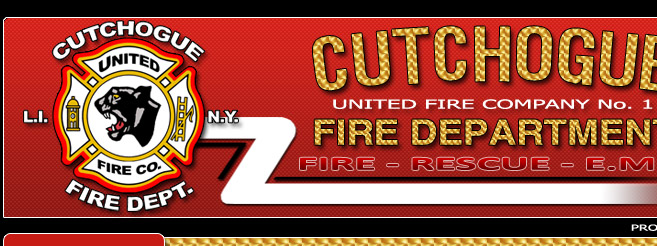| This week a summer heat wave has been forcasted to effect the Long island region and much of the Northeast Region of the United States. Locally temperatures are expected to reach the mid nineties throughout the weekend with high humidity.
The Cutchogue Fire Department would like to offer these safety tips to help the community prepare for battling the heat.
The best defense is prevention. Here are some prevention tips:
•Drink more fluids (nonalcoholic), regardless of your activity level. Don't wait until you're thirsty to drink. Warning: If your doctor generally limits the amount of fluid you drink or has you on water pills, ask him how much you should drink while the weather is hot.
•Don't drink liquids that contain alcohol or large amounts of sugar–these actually cause you to lose more body fluid. Also, avoid very cold drinks, because they can cause stomach cramps.
•Stay indoors and, if at all possible, stay in an air-conditioned place. If your home does not have air conditioning, go to the shopping mall or public library–even a few hours spent in air conditioning can help your body stay cooler when you go back into the heat. Call your local health department to see if there are any heat-relief shelters in your area.
•Electric fans may provide comfort, but when the temperature is in the high 90s, fans will not prevent heat-related illness. Taking a cool shower or bath, or moving to an air-conditioned place is a much better way to cool off.
•Wear lightweight, light-colored, loose-fitting clothing.
•NEVER leave anyone in a closed, parked vehicle.
•Although any one at any time can suffer from heat-related illness, some people are at greater risk than others. Check regularly on:
Infants and young children
People aged 65 or older
People who have a mental illness
Those who are physically ill, especially with heart disease or high blood pressure
•Visit adults at risk at least twice a day and closely watch them for signs of heat exhaustion or heat stroke. Infants and young children, of course, need much more frequent watching.
If you must be out in the heat:
•Limit your outdoor activity to morning and evening hours.
•Cut down on exercise. If you must exercise, drink two to four glasses of cool, nonalcoholic fluids each hour. A sports beverage can replace the salt and minerals you lose in sweat. Warning: If you are on a low-salt diet, talk with your doctor before drinking a sports beverage. Remember the warning in the first "tip" (above), too.
•Try to rest often in shady areas.
•Protect yourself from the sun by wearing a wide-brimmed hat (also keeps you cooler) and sunglasses and by putting on sunscreen of SPF 15 or higher (the most effective products say "broad spectrum" or "UVA/UVB protection" on their labels).
Assitionally The Cutchogue Fire Department encourages all residents to learn the signs for heat-related illness. Warning signs and symptoms vary but may include:
Heat Cramps:
Muscular pains and spasms due to heavy exertion. Although heat cramps are the least severe, they are often the first signal that the body is having trouble with the heat.
Heat Exhaustion:
Typically occurs when people exercise heavily or work in a hot, humid place where body fluids are lost through heavy sweating. Blood flow to the skin increases, causing blood flow to decrease to the vital organs. This results in a form of mild shock. If not treated, the victim's condition will worsen. Body temperature will keep rising and the victim may suffer heat stroke.
Heat Stroke:
A life-threatening condition. The victim's temperature control system, which produces sweating to cool the body, stops working. The body temperature can rise so high that brain damage and death may result if the body is not cooled quickly.
If you experience signs of heat stress such as dizziness, rapid heartbeat, diarrhea, nausea, cramps, throbbing headache, dry skin (no sweating), chest pain, great weakness, mental changes, breathing problems, or vomiting, Dial 911 immediatley. |




